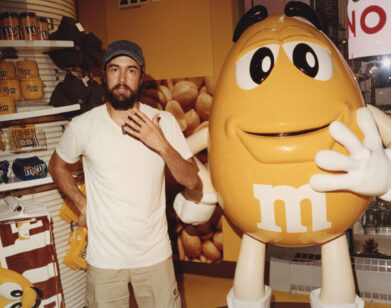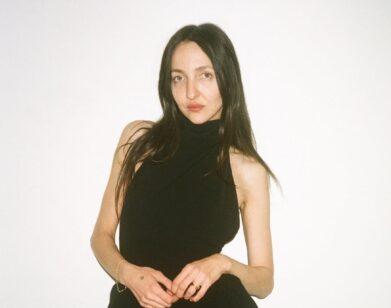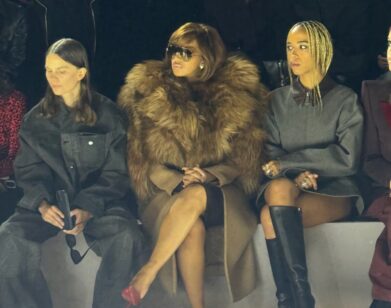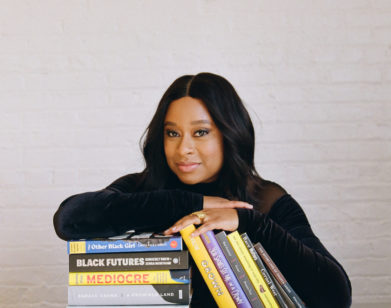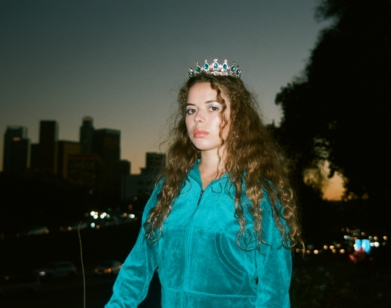LISTENING SESSION
Nilüfer Yanya on the Tracks That Shaped Her Genre-Bending Sound
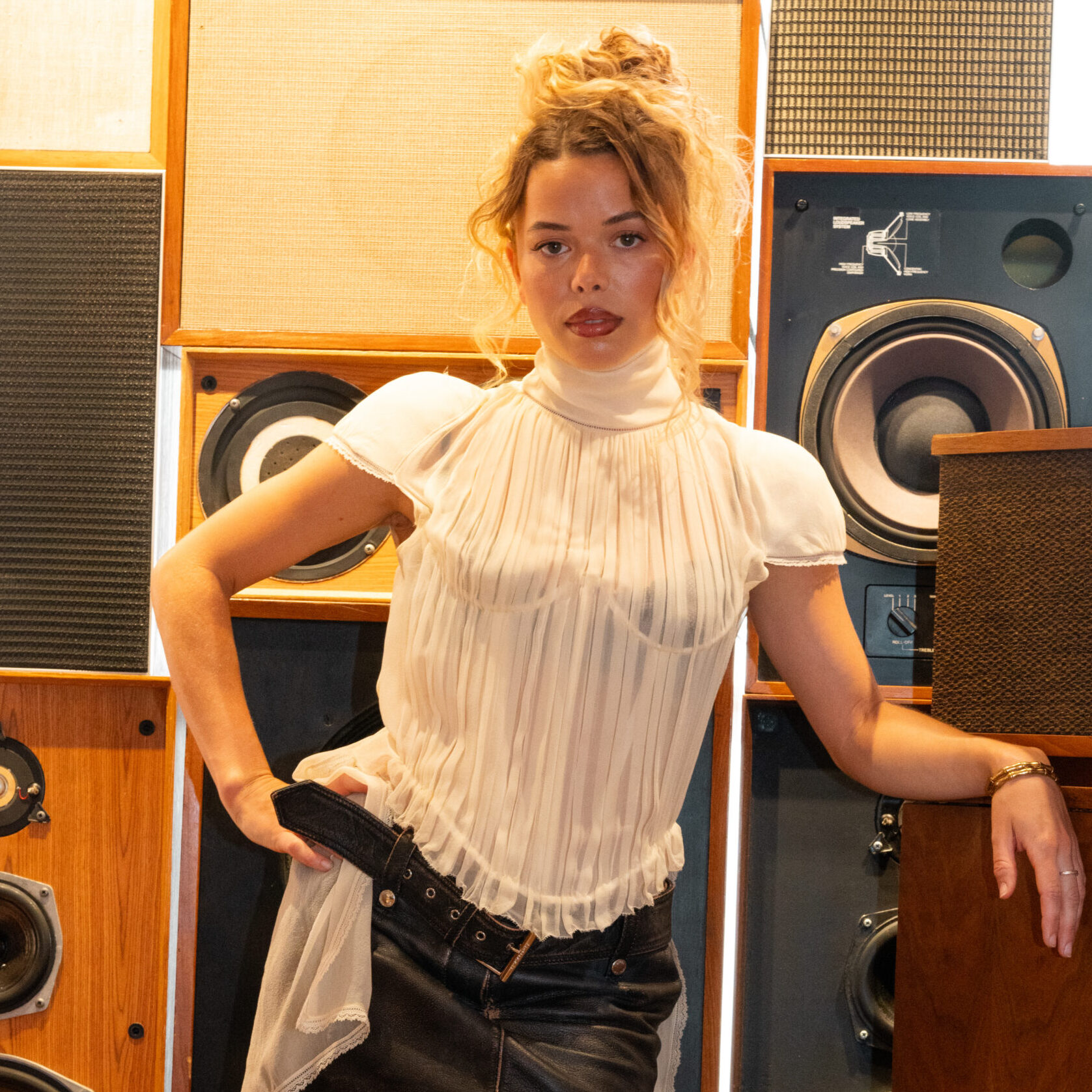
Nilüfer Yanya, photo courtesy of McQueen.
Nilüfer Yanya is her own toughest critic. After three exquisite studio albums, each followed by an international tour, the British singer-songwriter knows a thing or two about working under pressure. Most of it, she confesses, is self-imposed. “I think it’s about learning when to dial it back a bit and be kinder to yourself,” she told the London-based curator Cynthia Igbokwe at McQueen Reverb, an exclusive listening session hosted at the brand’s London flagship, last week. “That’s the hardest thing, to not obsess over what’s next.” Over the course of the evening, Yanya played a series of tracks that have informed her taste and sound over the years—from nostalgic indie staples by The Pixies and PJ Harvey to new releases by emerging artists like Nourished By Time. Between songs, she opened up about collaborating closely with her sister, writing her upcoming EP, and how she manages to stay cool when the pressure cooker’s cranked all the way up.
———
CYNTHIA IGBOKWE: To start, it would be nice to learn more about how you got into music and what inspired you to pursue that professionally.
NILÜFER YANYA: I got into music via music. I loved listening to music. When I was younger I played piano, but my first love was guitar and I started writing at a young age. Maybe around age 10 or 11 I started thinking, “I really want to be the person holding the guitar on stage.” Then I got really into writing my own material. I felt like there are these one-of-a-kind rewards you feel from making something by yourself, completely connected to something else that nobody else really knows.
IGBOKWE: What could you say was an early music memory, or a record or track that you connected to at that point?
YANYA: Literally anything with something interesting that could catch my ear. Then when I got into my teens, I remember the first time I heard The Pixies, in particular one track, “Hey.” A teacher showed it to me and I was just like, “Wow, somebody out there has made music the way I was hearing music, but it happened 20 or 30 years ago. How’s that even possible?”
IGBOKWE: It’s such a good track. I always think that personal growth is linked to artistic output. Considering your past albums, there’s always an evolution that’s happening. How would you define your growth as an artist?
YANYA: I think growth definitely comes from the inside. Real growth is internal, not external, so you probably don’t even notice it until you’re past it. I don’t ever feel like I’m growing. It just occurs to me a bit later like, “Okay, maybe I’ve learned something.”
IGBOKWE: As a new artist, what helped you figure that out? Or helped you to ask these questions, and then you found yourself covering or sampling certain songs from people?
YANYA: I would say another early influence was PJ Harvey. I have an obsession with one particular song, which is quite funny, because she’s made so many records and she’s had so many different phases. It’s called “Rid of Me.”
IGBOKWE: What’s interesting about her is that she speaks to people across so many genres. It’s not just rock or alt or indie, but you can see her influence on some hip-hop tracks and neo-soul records.
YANYA: I mean, it sounds so abstract at times. You’re like, “Is that a song?”
IGBOKWE: Is there anything about your current process where you’ve felt like, “There’s a breakthrough.” What’s on your mind right now with the stuff you’ve been working on?
YANYA: I would say it’s changed. The way I’ve been writing now is very different from how I started, primarily because I started writing by myself. It feels like you’re pulling it from the sky because it’s random. It could start with a melody that you had and then you’re translating it onto a guitar and then turning it into a loop or a riff or a hook. Trying to understand the difference between something that you hear in your head versus what sounds good recorded is very different and it’s something I didn’t totally trust. Trying to translate that with another person, because I’m not a producer, is overwhelming. I’ve always much preferred writing. Sharing that process with somebody has been humbling and scary at the same time.
IGBOKWE: How did you meet Will [Archer]? How did this dynamic start, and do you guys work together now?
YANYA: We had a session arranged. I’d heard one of the songs and I was like, “Wow, I really want to work with or have a session with him and see if we make anything,” because you never know. You can really like someone’s ideas and then not really gel. But he comes from a producing and sound art background, so his ideas are very experimental. A bit more like sound design meets orchestrating.
IGBOKWE: I know you just announced a new EP and it’s going to be out in around two weeks.
YANYA: Yeah.
IGBOKWE: Can you tell us more about it? How did the sound evolve from the last record?
YANYA: Will and I started working on some new material at the end of last year. We’d finished writing the record the year before, so we’d had a bit of time to reflect on some of the things that we’d done and some things that we’d maybe missed. In particular, there was one song at the end of the album, “Just the Western,” which I feel is a bit softer. It feels like that really is the thread between my last record and this EP. It’s called “Dancing Shoes,” and there’s “Treason,” which encapsulates that softer feel. It’s not out yet, by the way, so you’re hearing it first.
IGBOKWE: It’s so important for people to explore ideas over longer periods of time. I think we need to also sit with this meditative boredom and obsess over something for a longer period. How many tracks are you on your EP?
YANYA: There’s only four, it’s a small EP.
IGBOKWE: I wanted to talk a bit more about your visuals, and it’s so nice your family’s front row. I know that your sister plays such a big role in creative directing and working on music videos and the visuals. It would be nice to hear more about how working with family informs your creative vision.
YANYA: Me and my sister Molly have been making things together since we were young. She’s always been interested in film and video, so it was quite a natural progression when I asked her to start working on my music videos. Up until now, she’s been the only person that’s directed my music videos. It’s personal, and when you really trust somebody, you can make something that’s really you, as opposed to having to start from the beginning each time. I’m not saying there’s no other way to do it, but it has just worked for me. Wanting to stay hands-on is really the only way to think for me. Otherwise, I’m not really interested.
IGBOKWE: I think a lot of you young musicians have all these ambitious ideas about how they want to release music, and a lot of times, they’re things that aren’t really part of people’s current realities. I think it is super necessary and encouraging to do what you can with what you have right now.
YANYA: Yeah. I think there’s a lot of pressure to think of yourself as a brand from the start. And it’s a lot of pressure to see yourself as a finished product and also be the person making things. You can’t be both at the same time, but there’s a beginning and then there’s a time where you’re like, “Okay, this is ready,” and it’s probably never going to be finished ever, really.
IGBOKWE: In the future, it might look different, but at least it’s true to that situation.
YANYA: Yeah. Allowing yourself to be proud in the moment and then be like, “Actually, I hate this. I need to go back and do work.”
IGBOKWE: Were there any musical influences from your sister as well? Was there a theme across your family?
YANYA: Yeah. Molly is a bit older than me, so she was into music before I was into music, so a lot of her tastes influenced mine. There were a lot of artists I picked up on from her. I’ve got a record to play. It’s a bit different, but this is by Elliot Smith.
IGBOKWE: I find it so interesting hearing about these different influences, because you also mix a lot of different styles. How would you describe it yourself, and how comfortable are you with the fact that you may be in between styles?
YANYA: I’m actually the most comfortable in between as opposed to trying to stick to one thing. It’s almost like a fun experiment to try and make something from one genre and then see how wrong it turns out in a way. It’s almost like your body’s response to trying to fit into a box: you naturally push out. I’ve just given up describing music. I just see them as songs.
IGBOKWE: Who are some of the artists or genres that you find yourself gravitating towards right now?
YANYA: I would say a wide variety of genres or genreless artists. One of my favorites for a while has been Tirzah. It’s someone a bit different from the guitar world.
IGBOKWE: I love her so much. I think she’s one of the artists that has also given up trying to conform, and she basically just does her own thing and people take it as it is. I wanted to learn a bit more about just other influences that you have beyond music. Is there any particular space or medium that you explore outside of music?
YANYA: I love reading, and I’d love to try writing things other than just songs. I find reading very inspiring. You construct a world in your head and come up with different narratives and personas. Otherwise, film and just life. Learning about yourself is very hard to put into words, so I put it into music instead. Inspiration can come from anywhere.
IGBOKWE: What would you say are the conditions that need to be in place for you to feel most inspired?
YANYA: I would say I just really need to have the desire to make something. You can be anywhere. You can have loads of time or no time, or it can be very loud or very quiet and you can only hear thoughts. I do find leaving the city was very helpful, a bit more conducive to a writing environment, but most of these albums were made in London.
IGBOKWE: You’re going to be on tour this year quite a bit. Festivals here and then America later. How does working or thinking about music mix with performing, or are these different parts that you basically activate or shut off?
YANYA: I find myself shutting off when it comes to thinking about performing versus thinking about writing. It’s a learned thing from going through the album cycles and being like, “Okay, this is the writing time. Okay, now you’re releasing, now you’re on tour.” Naturally one thing does inspire the other. Having to play a song every night for a month really makes you think about it, or really makes you think about what you want to do next. But I do find it hard to write on the road or be in tune with my ideas because a lot of touring is logistics.
IGBOKWE: What track is always on your travel playlist? What are you obsessed with right now?
YANYA: This is an artist called Nourished By Time, the song is called “Shed that Fear.” I love this album. He’s a new artist, someone I’m listening to a lot right now.
IGBOKWE: He dropped a new single today, actually.
YANYA: And he has a new album coming, so I’m really excited about that as well.
IGBOKWE: He’s so good. I work a lot with musicians on artistic direction or development, and the main thing I’m concerned about is how they’re doing mentally and emotionally, considering tour schedules and the pressures of being visible all the time. I just wanted to ask you how you manage adjusting to audience expectations while trying to stay authentic and grounded?
YANYA: It’s a good question. For me, although my environment can be pressurizing, the biggest pressure is always going to come from myself. I think it’s about learning when to dial it back a bit and be kinder to yourself. Like, “Okay, that wasn’t perfect, but try and enjoy it anyway. Try to be in the moment.” I think that’s the hardest thing, to not obsess over what’s next. It’s treating it as a normal job, but also knowing that you’re making music that’s very connected to you, so you’re going to take it more personally if somebody doesn’t like it.
IGBOKWE: To close on this conversation and the listening session, I’d love to hear about an artist or a sound that is sparking early ideas about what a future sound could sound like for you.
YANYA: This is a friend, actually, Nick Hakim, off the record COMETA, and the song is called “Happen.”
IGBOKWE: Such a good song. Why did you select this one?
YANYA: It’s a more recent example of an old favorite. It’s got all the hallmarks of a really good song, but it’s vulnerable and it’s different from what I’ve heard before from Nick’s music. It has this subtler edge which I would like to explore in my own writing.
IGBOKWE: Thank you so much for selecting and sharing such beautiful music.
YANYA: Thank you.

